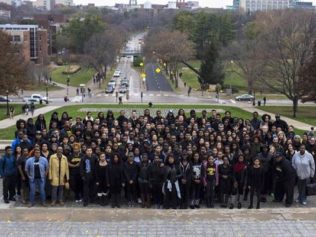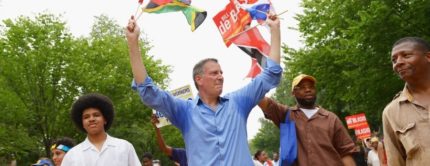In a two-hour press conference yesterday, New Jersey Gov. Chris Christie unleashed a long list of adjectives to describe his reaction to the George Washington Bridge lane closure scandal—blindsided, betrayed, embarrassed, heartbroken, humiliated, sad. But many conservatives and political observers seem to be in agreement that the scandal has done serious damage to Christie’s presidential aspirations for 2016.
Christie attempted to put the matter behind him by announcing that he had fired Bridget Kelly, his deputy chief of staff—without even speaking to her first — who he said was responsible for initiating the closure of traffic lanes leading into Fort Lee, a New Jersey town that sits next to the bridge and which many New Jerseyans use to access the bridge on their commutes into New York City. Kelly apparently was upset that Fort Lee Mayor Mark Sokolich hadn’t endorsed Christie in his re-election bid and sent an early morning message to David Wildstein, a Christie appointee to the Port Authority of New York and New Jersey, which oversees the bridge.
“Time for some traffic problems in Fort Lee.”
“Got it,” he wrote back.
But commentators like MSNBC host Rachel Maddow offered an alternative theory that the lane closures were actually a retaliatory move in a fight with Fort Lee-based state Sen. Loretta Weinberg, the state Senate Democratic leader, in a battle over a Supreme Court nominee, rather than a strike at Sokolich, who said he wasn’t ever pressured to endorse Christie.
Nevertheless, Sokolich called the lane closings a “venomous form of political retaliation.”
While Christie claimed at his news conference that he didn’t know anything about the political retaliation, very few people in New Jersey seem to believe the governor. In interviews on the street with residents of Fort Lee, CNN had a hard time finding someone who believed the governor was unaware.
Jose Perez, owner of The Cigar Room, called the governor’s explanation “bull.”
“This is the usual state of politics in New Jersey,” he told CNN. “In the end, who pays? The people. We’re the ones who pay for the political gains.”
“He runs a paramilitary organization, very strict discipline,” Barbara Buono, the state senator whom Christie trounced in his re-election campaign last fall, said on MSNBC. “People don’t sneeze or go to the bathroom without asking Christie’s permission to.”
The entire matter is especially damaging to Christie because it is consistent with his image as a cold-hearted bully, who often berates reporters and his political opponents in public at press appearances.
In the Republican Party, many conservatives still haven’t forgiven him for publicly embracing President Obama in the aftermath of Superstorm Sandy in 2012, which many point to as a contributing factor in Obama’s trouncing of Republican candidate Mitt Romney.
Sen. Lindsey Graham of South Carolina said it “reinforces a narrative that’s troublesome about the guy, he’s kind of a bully.”
Judson Phillips, who heads the Tea Party Nation, told CNN, “This incident is proof that once again the most dangerous place on the earth is the spot between Chris Christie and his presidential ambitions. I strongly suspect there will be litigation as a result of this and the beauty of litigation is the truth will come out. I strongly suspect there is much more to this than what Chris Christie let on in his news conference.”
While the lane closures turned traffic in Fort Lee into a “parking lot,” the likes of which Fort Lee residents say they have never seen before—and this is a town used to serious traffic snarls around the bridge—emergency medical service responders in the town had trouble reaching residents in need. There were even reports that a 91-year-old woman who had suffered a heart attack died possibly because she couldn’t be reached in a timely fashion.

